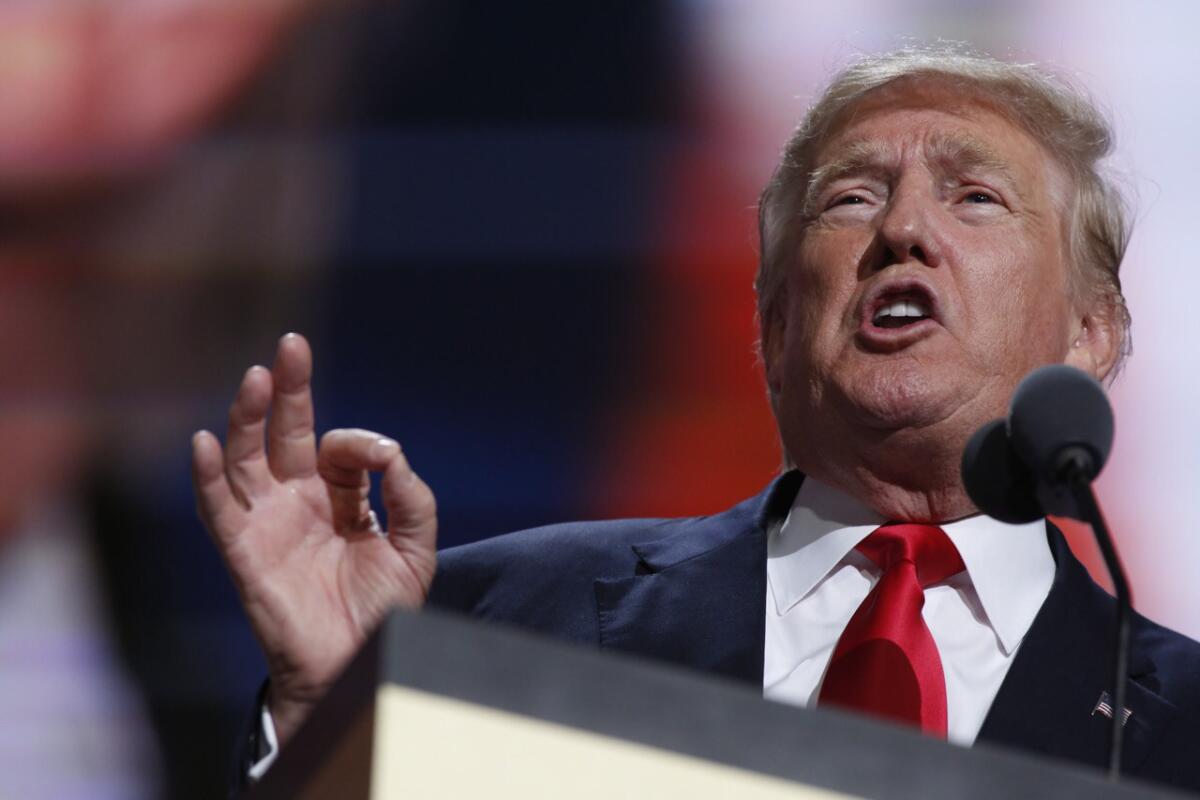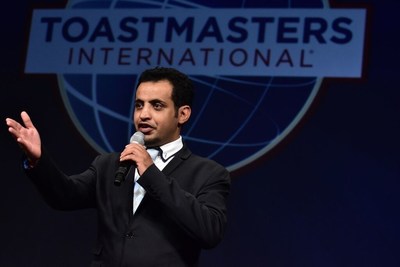Too much ‘my,’ not enough ‘we’: Pro speakers grade Donald Trump’s oratory skills in GOP convention speech

- Share via
Donald Trump just spoke to one of the highest-profile stages in American politics at the Republican National Convention. How did he do? We asked Toastmasters, a 332,000-member global organization focused on helping people become effective communicators and leaders.
We invited its 2015 public speaking world champion and international president to offer snap evaluations similar to those done in two minutes at Toastmasters meetings, focusing not on the content or the politics but on the presentation and performance.
Here’s what they had to say, in their own words, edited for brevity:
World Champion of Public Speaking Mohammed Qahtani

He followed a very clear structure that was easy to follow. He quickly established rapport with the audience by focusing on what they want to hear. He used people’s language and spoke like a person who cared. However, I felt like he used too many numbers and statistics trying to convey his point.
In terms of presence onstage, although he was strict with the podium, he did manage to effectively engage the audience with body movement using his hand gestures. He distributed eye contact to everyone equally. However, I think he stuck to one particular hand movement.
He has [a] great commanding voice that was clear and projected strength. He also varied his tone and raised his voice on important phrases in his speech to allow it to stick [in] people’s minds, and he did effectively use pauses to allow his audience to digest his speech. However, I felt he was pausing more than needed and his pauses were a bit too long. That might disconnect the audience at times.
Overall, great presence onstage, excellent commanding voice and comprehensive speech writing. I would advise him to focus less on the numbers and statistics and more on touching people’s feelings and emotions. I would also recommend using less frequent pauses.
Toastmasters International President Jim Kokocki

I observed several strengths such as simple, clear word choice and quite good use of vocal variety.
At times, he spoke in a quiet and sincere manner and more frequently with passion and more volume. His pacing during the speech was very good and varied. At times he spoke rapidly and at times more measured. His use of eye contact was strong, looking with purpose throughout the auditorium while he spoke. Use of gestures and body language was limited with an over reliance on the “OK” gesture and pointing. Simply having his hands in an open position would add variety and would appear very natural.
At one point [Trump] clapped into the microphone, which is typically very loud. When in front of a microphone, it is better to make a clapping gesture without actually clapping one’s hands together as the audience will see the gesture and follow.
Trump is very good at calling attention to key points by interjecting phrases such as “Think of this! Think of this!” He was very good at reading the audience energy and allowing the audience to express their enthusiasm.
There were a couple of misses in this regard. When he was introduced, there was loud applause and cheering, and Trump did a good job of letting the crowd express themselves. But then he started with a quiet, low-key “thank you, thank you.” This was an opportunity to comment on their enthusiasm and let them express their excitement further. Generally, a speaker should try to meet the audience at their excitement and energy level.
There was some opportunity for more consistency. I noted at the start an emphasis on working with the audience on a message of “we are a team.” However, later in the speech, he spoke of “my opponent.” “We” became “my.” This seemed like an opportunity to further unite the crowd with “our opponent.”
All in all, Trump is a talented speaker and during his 70-minute address displayed very strong speaking skills.
Chat me up on Twitter: @mmaltaisLA
A more restrained tone and an appeal to populism: 5 takeaways from Donald Trump's acceptance speech
‘I am your voice': Trump shouts through an all-caps acceptance speech
Get the L.A. Times Politics newsletter
Deeply reported insights into legislation, politics and policy from Sacramento, Washington and beyond. In your inbox twice per week.
You may occasionally receive promotional content from the Los Angeles Times.








